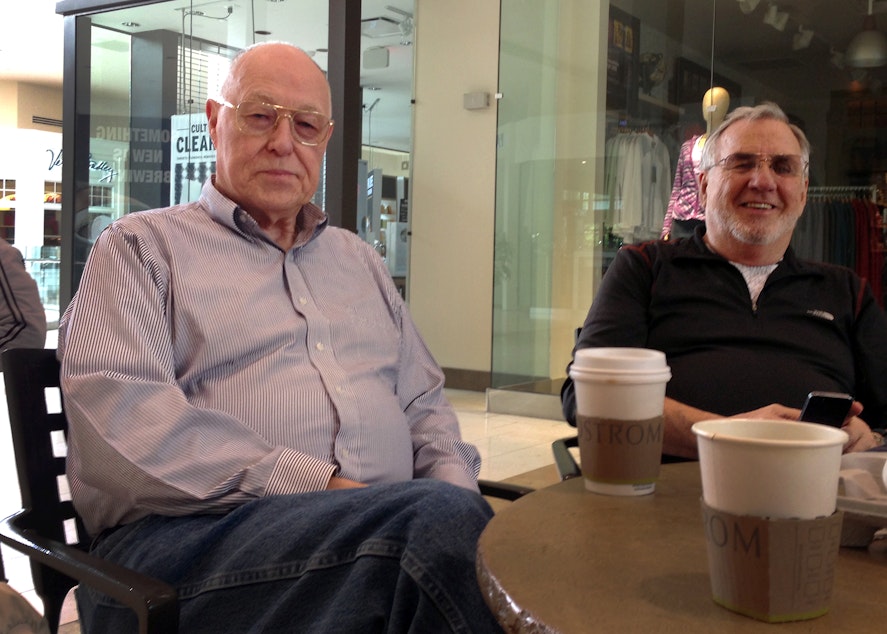How To Walk To LA And Back 7 Times Without Leaving Bellevue Square

Shops aren’t open yet, but a little before 8 a.m., Bellevue Square is already buzzing with walkers.
Carrying a portable oxygen tank, Jon Tucker is one of them. “I’m not very fast, but I get there,” he says.
Mall walking has been around for decades, but it’s undertapped as a way to keep older adults fit, says UW School of Nursing professor Basia Belza. If she had her way, there would be more structured walking programs like this one, a joint effort between the mall, Overlake Hospital and the YMCA. Here, people sign in and get their blood pressure checked before they walk.
Tucker, 76, and his wife are regulars here. These days she walks upstairs while he does laps on the lower level. “Right now she’s waiting for a knee replacement so she’s not moving real fast,” Tucker said. “Even though I move slow, she’s moving slower.”
Three times a week, Tucker walks two laps around the mall. It’s been his morning routine for the past 10 years to manage his diabetes. The only times he couldn’t make it were after open-heart surgeries and, later, chemo to treat Hodgkin’s lymphoma.
Sponsored
But other than that, Tucker has been diligent. He says walking helps maintain his strength and balance.
He says going to the gym for exercise bored him. “You look at the same wall all the time, and I didn’t find myself motivated,” he said.
National guidelines recommend that all adults get at least two and a half hours a week of moderate exercise. Belza says that’s not happening.
Belza is part of a Centers for Disease Control team that’s trying to figure out how to get older adults more physically active. Turns out, this age group prefers walking, and it’s easy to see why. It’s simple, and all that’s required is a pair of good walking shoes. But going out for a walk in your neighborhood can be complicated.
“We find there a lot of issues with sidewalks being uneven, with curb cuts missing, with traffic being hazardous,” Belza said. “Any number of issues that may make any older adult not necessarily feel safe going out, walking for a quarter of a mile.”
Sponsored
The environment isn’t the only issue. There are physical limitations, too, like joint pain or having to use the bathroom frequently.
“One of the benefits of malls is that they have bathrooms; bathrooms are typically clean and they’re open,” Belza said. “So for a man or woman who might have problems with urinary incontinence, there’s a ready resource to help them with.”
And there are benches so people can rest. Malls are covered and climate-controlled so it doesn’t matter what the weather’s like outside. One man at Bell Square has logged more than 16,000 miles. That’s like walking from Seattle to Los Angeles and back seven times.
Belza says not all walking programs are at malls. Seattle’s Woodland Park Zoo and the Xfinity Arena in Everett are open to walkers on certain days.
One other nice thing about walking is that it’s not competitive; folks can go at their own pace. There’s a sense of camaraderie, says Belza. “People encourage each other. They don’t require, they don’t mandate,” she said. But there can be subtle nudges. “Let’s go one more lap, you know. Tell me what else happened over the holiday, or what is it about the new grandchild that you haven’t told me yet about.”
Sponsored
And the socialization of walking helps with overall wellness.
After his walk, Tucker heads up to the mall’s second level for coffee with friends. “Alright guys, you have to behave yourselves now,” he tells the group.
“There’s Jim, a retired Boeing engineer. There’s Ted, a retired navy pilot among other things … then there’s Joe.” One by one, Tucker introduces me to the friends he’s made through the walking program. “These folks have been around longer than dirt,” he says with a big smile.
And Tucker says the walking program keeps him going longer, too.

